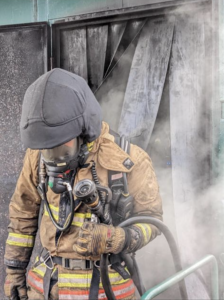Yes, You Have Made it in FX. But Can You Retire?
Posted by Colin Lambert. Last updated: September 18, 2023
We all dream of retirement right? Well, Eva Szalay has some words of wisdom – and warning – for those planning to take just such a step.
Dave Reid spent his career heading up some of the world’s largest FX prime brokerage businesses. Since retiring in the summer, he just runs into burning houses. Clive Hadingham, meanwhile, is allergic to horses but his post-FX life finds him heading a racing syndicate and attending yearling auctions.
If you think this is weird, it might come as a surprise to think that something similar could happen to you soon.
We’re at the time of the year when thoughts of retirement swim into focus. September brings with it a sense that the window for fun has closed for another year, with memories of sand sea and sun banished to the distant past by calendars bursting with meetings, brainstorming sessions and catch-ups with the boss.
In short, this is the time when some of you may be entertaining fantasies of sunny days on the golf course with cold beer frothing over in celebration of a day well spent. Or maybe you want to lie on a beach all…day…long…
I’m here to tell you that you would probably hate it.
Here is a warning: foreign exchange might be a cruel mistress, but the path towards the exit is littered with bodies that tried to change and do something else but ultimately just couldn’t make it. (Editor, we’re looking at you*).
We all know people who retired amid much fanfare, only to return to the business in a year or two, normally in some form of strategic advisor, NED or cushy senior role that bolsters the illusion that they’re not “working-working” just “keeping busy.”**
If you don’t want to be THAT guy or gal, help is at hand. With The Full FX being a community-minded publication, I’ve collected some (paraphrased) advice from recent retirees on how to do this thing RIGHT. (This piece might not even get published; the Ed might be busy writing about cricket….)
Your definitive, six-point plan for leaving FX:
- Don’t think that a hobby is enough – your self-esteem is too fragile to bear not being busy and important.
- Working in FX life is busy and thrusting. In retirement the days stretch without a single appointment and the only thing that fills you with is dread.
- Identify transferable skills – if you can’t find any, you must be pretty senior.
- Plan carefully what you will do. Whether it’s a second career, philanthropic efforts or community work, don’t just expect it to happen – for starters, there might be an age limit. So that’s you probably ruled out.
- Evaluate whether having no income will have an impact on your lifestyle and whether that’s something you can live with – it might not be enough to just kick the kids out.
- Consider the impact on others. To quote Hadingham: “I’m home all the time and my wife hates it!”
*Excerpt from an email from the owner, founder and CEO of The Full FX: “feel free if it’s required to compare their success in escaping to yours truly, who, when I stopped trading, was determined to do something totally different like write about cricket…”
**When all else fails: Write a list of companies where you can become a non-executive director or strategic advisor and draft a press release about your return to FX – this will ensure that everyone knows you have given up golf/wine/family and have no friends left because everyone hates your guts since you’re ALWAYS around!
Dave Reid
“When you retire it’s important to do something meaningful, it just gives you a focus,” Reid, formerly of Deutsche Bank and Citi, tells me. He is currently a trainee with the Northumberland firefighting service.
He sounds tired when we speak, after a 4:30am call out had disrupted his night. Reid is the oldest person to have passed the firefighter physical test in Northumberland, which is an achievement even if there are hardly any people in the county.***
For him, becoming a firefighter wasn’t a childhood dream, he isn’t like Daren Hill, who fulfilled his long-held ambition a few years ago to become a train driver by chucking in his FX job. (Legend!) It was purely a pragmatic decision, meticulously planned.

This is Dave Reid…Honest!
“Russ [LaScala] told me of a guy who was a golf fanatic and he couldn’t wait to retire. But when he did, he spent something like 200 days on the golf course in the first year and he came to absolutely hate it. I didn’t want to end up like that,” he adds.
In his former life, Reid was an MD at the German bank tasked with (among other things) evaluating and minimising risks to DB’s FX franchise, a skill that’s been a key thread during his career as an FXPB head. Now, as a trainee firefighter he does something very similar: thrives on adrenaline and high-pressure situations, except instead of just figuratively running into burning houses, he does it for real.
“It’s an interesting process to go from a metaphorical firefighter to an actual one,” he observes. “In many ways, it’s similar skills: making decision in high pressure situations, assessing and minimising risks. We talk about risks all the time. It’s a different type of risk but there is a familiarity with the process, so that’s where I’m coming at this from.”
He breezily tells me that he spent his last year at the bank commuting from near Hexham to the city, which apparently “wasn’t too bad,” presumably because the four hours each-way trip allowed him to time to research his retirement career.
The first thing he did was to find out if there was an age limit – there wasn’t one.
Reid clearly loves his new gig. He gives me a crash-course in the operational set-up of the UK’s firefighting service and tells me about things like having to live within eight minutes of the station as well as how they very often get called out for false alarms. But Northumberland being a rural area means “there are lots of accidents and barn fires” and plenty of mishaps involving agricultural machinery.” And, presumably, the odd cat stuck up a tree.
“You don’t know what you’re dealing with until you get on the truck,” Reid says.
Reid is at pains to stress that he hasn’t morphed into a Tom Cruise-type character (Tim Cruise?), and that his role is more about changing fire alarm batteries for elderly folks than rescuing distressed damsels from burning stables. Although he does admit to enjoying some of the more macho aspects of the training and the job. “It was a lot of fun learning to cut up cars,” he says. His view on having to run into a burning building wearing equipment and masks and the whole works is that it is “more fun in retrospect.”
There is also plenty of office politics.
“It’s been interesting going from an MD at a bank to being at the bottom of the bottom, and in some ways the fire service is more hierarchical than banking,” Reid reflects.
At this point our conversation is interrupted by a domestic incident: a bird has flown into Reid’s house to the surprise and glee of their cat. Before I let him get on with this latest rescue mission, I ask if being a junior has made him think that he would have done some things differently as an MD.
“I was never the sort of person to go around saying hey, I’m an MD, so I’m not sure I would have changed a great deal. But it does make you conscious as a junior, how important it is for senior people to manage effectively,” he says before signing off and returning to his busy, post-FX life.
*** Dave knows I’m joking…I hope.
Clive Hadingham
When I first messaged Clive about this interview, he suggested a Friday when he only had a lunch and some afternoon golf scheduled. But there are plenty of downsides to life as a retiree from the FX industry.
“I do get stressed about golf. And it’s funny how I also seem to be doing more of the dishes and the ironing than before,” Hadingham ponders. “But it’s 100% worth it and I love it. Although if you ask my wife, she said she hates it because she works from home and I’m always around.”
(If you’re feeling sad for Clive because of the hardships he must suffer daily, you can buy a share in one of the horses owned by his racing syndicate, Surrey Racing. Or don’t, he is having a better time than you are already!)

What do you mean “You missed it”? Oh, sorry. Wrong career!
Hadingham chucked in his 35-year FX career earlier this spring in a bid to focus on his horse racing syndicate business. He became a racing fan while being entertained by brokers and the big-ticket events such as Goodwood and Ascot and together with a friend they set up a business six years ago. He says that while the venture has yet to make money, it hasn’t made losses and they’re in the process of expanding into France (a bit like some of the banks he worked for?)
“I’m kind of doing the same thing but in a different industry. We’re taking clients to the races, lunches and the sales so it’s a very similar, client relationship type of role, just a lot more fun,” he tells me. He plays golf twice a week, by the way.
His decision to quit FX gradually matured until last year when he started to lay the groundwork for leaving by telling his bosses and effectively doing a six-month handover with his replacement. One of Hadingham’s top tips is to prepare for the transition because it’s a big shift to go from the early starts and the full diaries to, well, nothing much. For those that are contemplating retirement, he recommends cutting down to two- or three-day working weeks rather than stopping altogether.
“You’ve got to find something to fill the time. You’ve got to have something to do, you can’t just stop working,” he says. “FX and horse racing are actually quite similar, they’re both competitive and I still get a buzz from it, but it’s not constant, it’s not like we have horses running every day and every week. And for example, next week, I’m looking at my diary and there is nothing on,” he says, presumably contemplating yet another day of lunches and golf. (see above)
Then there is also the financial aspect of stopping work. Or as it were, there isn’t. Unexpected events such as the war in Ukraine and the subsequent inflationary spiral are pretty real when you don’t have an income, he says.
“I realised that things had to change in terms of spending. You have to weigh up whether you can go on just one holiday a year instead of two but not work as hard and whether that’s worth it for you or not,” he says. “When you give up work you have to accept that some things have to change.”
It’s obvious that less stress and a more leisurely routine is better for one’s health than little sleep, long hours and languorous lunches, and let’s face it, few of you contemplating retirement are in your 30s (if you are, I’m sorry but I can’t talk to you, you’re too annoying and I hate you.)
Hadingham calls the stage of life he is in at 54 the “sniper’s alley” where ill-health could strike any time. “I didn’t want to work all my life only to retire and then not being able to enjoy it. That was a huge factor for me,” he says, before noting that his enjoyment from working in FX has diminished over the past few years as well due to cultural shifts in the industry. And yet, and yet, Hadingham is showing signs that he, in fact, still very much does give a FX.
“I miss catching up with everyone, and actually, if someone offered me a two- or three-day consulting role, I’d probably take it.”
Perhaps it’s time to craft that press release?

